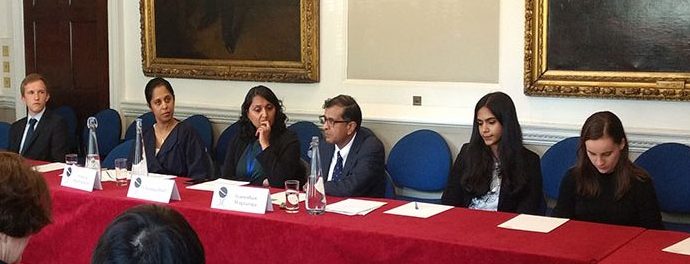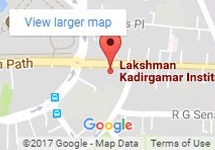
Reading Time: 2 min read
Dr. Ganeshan Wignaraja, Executive Director of the Lakshman Kadirgamar Institute of International Relations and Strategic Studies (LKI), and Dr. Dinusha Panditaratne, former Executive Director and Nonresident Fellow, LKI, recently delivered a joint presentation at The Royal Institute of International Affairs – also known as Chatham House. They were invited to provide a Sri Lankan perspective on ‘Challenges of a Rules-Based Order in the Indian Ocean,’ on 26 April 2019 in London, before a roundtable audience of policymakers, diplomats and academics in the UK.
The Indian Ocean—one of the world’s busiest trade routes fuelled by China’s rapid growth—is at risk of becoming a less stable and governable space. Speaking from the perspective of Sri Lanka—a smaller littoral state that aspires to become an economic hub in the Indian Ocean—Dr. Wignaraja and Dr. Panditaratne outlined threats facing the region, assessed the adequacy of existing international arrangements to address them, and considered what could be done to strengthen the rules-based order in the Indian Ocean alongside its development as a zone of trade.
Dr. Wignaraja mapped the growth trajectory of the Indian Ocean and spoke on the untapped economic potential of the Indian Ocean region. The rapidly growing Indian Ocean economy accounts for about one-fifth of global GDP and land area and is projected to become a global growth pole by 2025. He then discussed how the strategically located Sri Lanka can exploit the opportunities from an expanding Indian Ocean economy and recover from the Easter Sunday attacks. Dr. Wignaraja called for a comprehensive national response that involves an integrated set of security, governance and development policies. Dr. Panditaratne spoke on the risks to a stable and prosperous Indian Ocean. These include (i) intensifying ‘great power’ rivalry in the Indian Ocean, (ii) regional challenges of depleting environmental resources, smuggling, and violent extremism, and (iii) suboptimal national governance systems among some Indian Ocean states. She noted that while Sri Lanka is pursuing a rules-based order in the Indian Ocean to deal with great power rivalry and regional challenges, this pursuit first requires a strong rules-based system in the national context.
The event was attended by Sri Lanka’s High Commissioner to the UK, H.E. Manisha Gunasekera, and Deputy Chief of Mission, along with a range of governmental and non-governmental experts in the UK whose work focuses on Sri Lanka, South Asia and the Indian Ocean region. The presentations were followed by an active and informed discussion among the audience, chaired by Dr. Champa Patel, Head of the Asia-Pacific Programme, Chatham House.
Chatham House, also known as the Royal Institute of International Affairs, is a leading international policy institute. LKI is a think tank that analyses Sri Lanka’s international relations and strategic interests, to provide insights and recommendations that advance justice, peace, prosperity, and sustainability. The Institute reflects the vision of the late Hon. Lakshman Kadirgamar by promoting the country’s intellectual profile in foreign policy research and engagement. For more details visit www.lki.lk.



